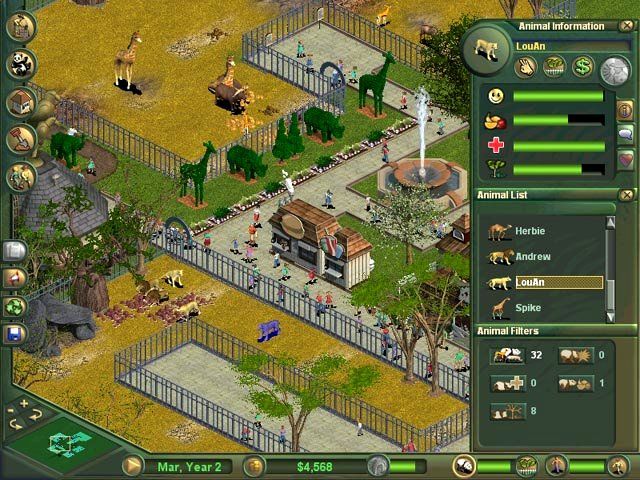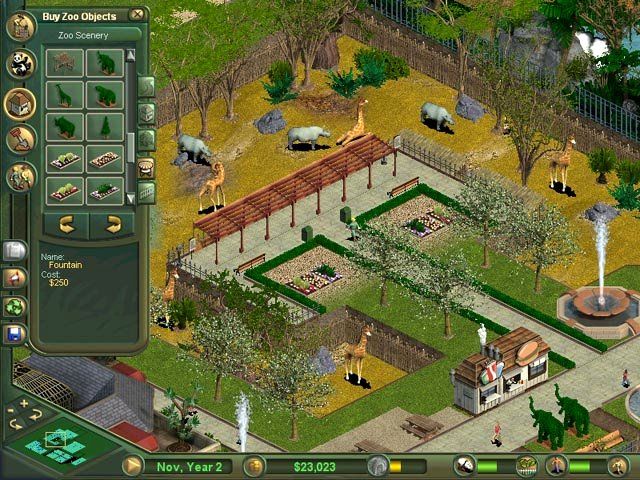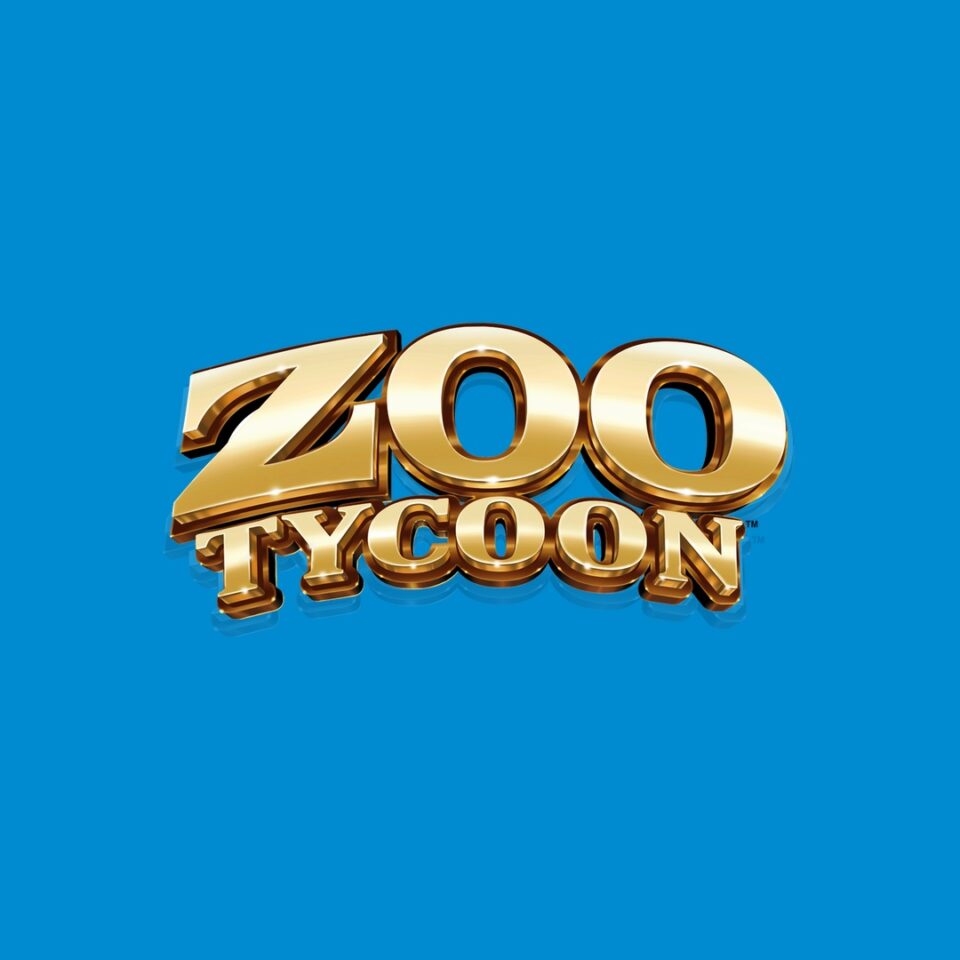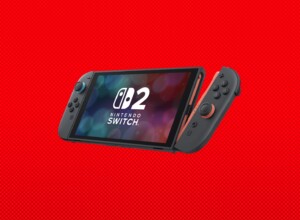In a retrospective at GDC 2023, former Blue Fang Games president Hank Howie looked back on the development of Zoo Tycoon.
Zoo Tycoon is a 2001 simulation game developed by Blue Fang Games and published by Microsoft Game Studios for PC. The game allows players to build and manage their own virtual zoo and was widely praised for its engaging gameplay, educational value, and offbeat humour. It spawned several sequels and sold over three million copies.
Blue Fang Games was founded in 1998 by a group of developers from Papyrus Design Group, a studio renowned for its NASCAR and IndyCar games. The startup was led by Adam Levesque and John Wheeler, with Hank Howie brought on board as business lead and president.
Despite the studio’s experience in making racing games, Levesque was keen for Blue Fang to branch out in a new direction. One early idea he suggested was for an ambitious game focused on dragons. The pitch had everything you might expect: flying, fire, strategy, and role-playing. On paper, it was fantastic, but the pitch received a lukewarm response from potential publishers.
The launch of Chris Sawyer’s Rollercoaster Tycoon in late 1999 was a pivotal moment for Blue Fang. John Wheeler took inspiration from the game and worked on a new pitch for the studio’s debut project called Airport Tycoon.
Howie, among others, wasn’t convinced. “Airports are not fucking fun,” he says. “Everybody at airports is stressed out. It’s complete anxiety.”
Wheeler’s idea circulated around the team and was met with various degrees of enthusiasm. The moment of clarity that changed the studio’s fortunes eventually came from engineer Brian Shea, who said: “Airport Tycoon? Why wouldn’t we make Zoo Tycoon?”
With some coaxing, Wheeler eventually came around to the idea, and the studio began to pitch the game to publishers.
“We developed this 10-page pitch proposal in early 2000. It was printed and FedExed to all the publishers, including Microsoft,” says Howie. “Unbeknownst to me, Microsoft had kicked off this new game division called Microsoft LIFE Games. Shawn had just been in a meeting the day before where the LIFE group had whiteboarded all their good ideas for family-friendly stuff. And the number one idea on the board was a zoo game.”
Blue Fang’s pitch eventually landed on the desk of Shane Kim, who was then in charge of the LIFE Games group. Kim arranged a meeting at GDC 2000, and the Blue Fang Games team successfully pitched Zoo Tycoon. An agreement was signed and supported by a sizeable advance.
Recalling the deal, Howie says: “I have this thing about numbers. Never give somebody a round number. If you give somebody a round number, they just think you plucked it. So I always give esoteric numbers, like 1.937 million dollars.”

Work on Zoo Tycoon began in late 2000. Development progressed smoothly, to a point, but one early problem significantly changed the game’s direction and tone.
“This issue came up, and it was animals attacking the guests,” Howie says. “I did my diligence as president of the company. I talked to everyone and said, ‘How do you all feel about this?’ They all said, ‘We think the animals should attack the guests.'”
All but one.
“There was only one person who didn’t think the animals should attack the guests,” recalls Howie. “Unfortunately, it was Adam, who was, you know, the founder, the producer, the lead designer.”
Levesque said that the situation was not realistic. Although, as Howie points out, there are news stories every year about people who foolishly enter lion or bear enclosures. Nonetheless, Levesque was steadfast and didn’t want to include the feature.
“But we just knew,” says Howie. “It just had to happen. It’s a game. We had to put some fun in there.”
To help make the case, Howie spoke to Charlie Peterson, Zoo Tycoon‘s producer at Microsoft.
“Microsoft doesn’t like to weigh in on the creative side. They are pretty good about that,” he says. “But I said, Charlie, do you think the animals should attack the guests? He said, ‘Oh yeah.’ How about everybody else at Microsoft? He said, ‘Oh yeah!’ I said, ‘Well, you gotta fucking help me. We gotta get Adam to buy in.’
“So we got on a call with Charlie and Shane Kim, and Charlie said, ‘Well, we don’t like to do this, but the overwhelming evidence is that we should have animals attack the guests.'”
Levesque finally relented but only on the understanding that the violence was humourous and that no blood was shown on screen.
“Microsoft had done a lot of playtesting and focus testing,” Howie says with a slight smile, “but I think Charlie fudged the data.”

A trickier problem to solve also emerged from Microsoft’s playtesting sessions. Some players said they were doing activities with the zoo’s animals, but they couldn’t tell if their actions were making the animals happy. The game wasn’t providing enough feedback to the player.
“We gathered the team together. There were about 12 of us at the time,” remembers Howie, “and we put the issue out there. Adam’s rationale was, ‘Look, the game has to have some challenges, right?'”
Howie says that artist Alex Chouls shot straight back, saying, “‘Well, I don’t think the challenge should be the interface of the game, OK?’ And that didn’t go over well at all. At all.”
With the conversation heating up, Howie says it was another flash of inspiration that saved the day.
“Finally, Adam – and this really happened – he stands up and goes, ‘Dammit, what do you want me to do? Like, when you do something good, you use a smiley face? And when you don’t, you use a frowny face?’ And we all just stopped.”
And that, Howie reveals, was the answer. Emoticon-style iconography was added to the game, instantly giving players feedback on their actions. And just like that, the problem was solved.
Zoo Tycoon was a profitable first venture for the fledgling studio. The game shipped on time and within budget, and Blue Fang Games received an unexpected $2 million royalty cheque from Microsoft. Howie puts the game’s success down to several factors.
“We liked the idea of making a game that everybody could play rather than a core game,” he explains. “And we definitely had the right publisher.”
Howie praises Microsoft’s input, saying there was an alignment of interests, including the game’s target audience, budgetary scope, and development timescales. And, for the most part, Microsoft let the Blue Fang make the game they wanted to make.
“We built a really great company. I felt best about that,” Howie says.

Blue Fang Games went on to develop a series of expansions for Zoo Tycoon, including Dinosaur Digs and Marine Mania. Zoo Tycoon 2 followed in 2004, and then two games were released for the Nintendo DS.
“It was a different time,” reflects Howie. “That deal that we did with Microsoft, they own the IP. They still own it today. Those were the sort of deals you did back in the day. You absolutely needed a publisher back in the day. You had discs. You had boxes. You had manuals. You had physical distribution. You had all that stuff. And then, you had to be in brick-and-mortar stores. We sold pretty much all of our products through Walmart, Best Buy, and Target. All the big stores.”
A decade of expertise with animal games was poured into the studio’s final big release, World of Zoo, which was released for the Nintendo Wii in 2009. The experience wasn’t a happy one for Howie. He cites the well-documented challenges of being a third-party developer for Nintendo, plus the additional challenges of having the troubled THQ as publisher.
The original plan was to develop a new zoo-based game for the PC and then port it to the Nintendo Wii. However, despite the perceived overlap of non-core audiences, the two platforms couldn’t be more different. Howie says they had to back one horse. And they chose the Wii.
“Some of the animations in that game are tremendous. It’s a really good game, but the Wii platform was designed and built for something else,” he says. “But even that, it didn’t do badly. It earned out. We could have made a second game, but at that point they were in so much trouble. It was just too bad. The other thing going on at the time was that the PC was dead, supposedly. Consoles were the darlings at all the publishers, so that was the environment at the time.”
A smattering of mobile and Facebook games followed, but they didn’t restore the studio’s position. Blue Fang Games eventually closed its doors in 2011.

Howie is evidently proud of the studio’s work but also pragmatic about the ups and downs of the game industry.
“One of my favourite sayings in life is ‘timing is everything’, and it generally is. You can have a great idea, and you can execute it really well, but if your market timing is bad, it’s just not going to work. My own personal belief is that money is OK, but it’s ephemeral. Who cares? It’s the important things in life that matter.”






